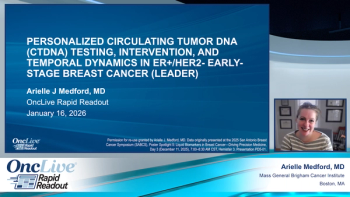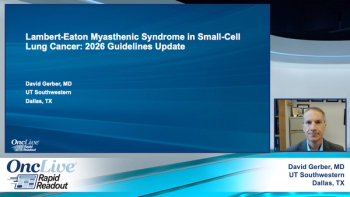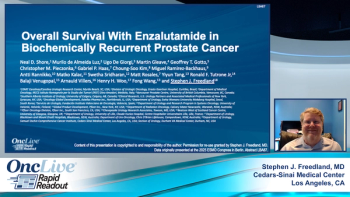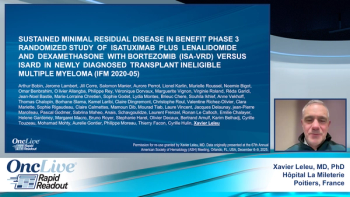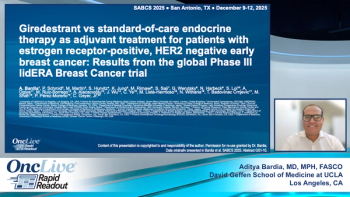
|Videos|June 22, 2022
Final Analysis from AMPECT, an Open-Label Phase 2 Registration Trial of nab-SIROLIMUS for Patients With Advanced Malignant Perivascular Epithelioid Cell Tumors (PEComa)
Author(s)Vinod Ravi, MD, MS, MBA
Dr Vinod Ravi talks about nab-SIROLIMUS and reviews the data from the AMPECT trial.
Advertisement
Background
- mTOR pathway activation is common in PEComa.
- PEComa are associated with alterations of TSC1 or TSC2, which are negative regulators of the mTOR signaling pathway.1
- Nab-sirolimus is an mTOR inhibitor (mTORi) with significantly higher anti-tumor activity, significantly higher intratumoral drug accumulation, and significantly higher mTOR target (pS6 and p4EBP1) suppression in preclinical models.
Methods
- Sample Size: Overall response rate (ORR) of ~30% in 30 evaluable patients to exclude the lower bound of the 95% CI of 14.7%
- Efficacy Evaluable Patients: Must receive 1 dose or more of nab-sirolimus; must have centrally confirmed PEComa
- Primary End point: ORR by independent radiology review (RECIST v1.1)
- CT/MRI every 6 weeks for the first year, every 12 weeks thereafter
- Secondary End points:
- Duration of response (DOR), progression-free survival (PFS) at 6 months, median PFS, median overall survival
- Safety
- Key Exploratory End points: Investigator response assessment
- Biomarker were mutational analysis (NGS, IHC, FISH)
- Baseline Demographics, Characteristics, and Disposition:
- Median follow-up was 22 months (range 1, 58)
- Thirty of thirty-four patients discontinued treatment; the main reason was PD (59%). Other reasons included adverse event (AE), surgery, withdrew consent, and death
- Four patients have ongoing treatment (all responders)
- Six patients are in post-treatment, on-study follow-up for survival
Results
- Two patients converted from a partial response (PR) to a complete response (CR) after 11 months and 34 months of treatment, respectively
- Median DOR has not been reached, 50% of patients had a DOR of more than 36.1 months (range 5.6, 55.5+ months)
- No grade 4 or 5 treatment-related AEs
- No unexpected AEs or new safety signals
- Pneumonitis in 7 out of 34 (21%) patients was grade (G)1/G2 only
- Discontinuation due to AEs: 2 out of 34 (6%) patients (G2 anemia and G1 cystitis)
- Treatment-related Serious Adverse Events were:
- Dehydration in 6% of patients and 3% each of acute kidney injury, acute coronary syndrome, abdominal pain, diarrhea, edema, enteritis, and pancytopenia
- All recovered / resolved
- Dehydration in 6% of patients and 3% each of acute kidney injury, acute coronary syndrome, abdominal pain, diarrhea, edema, enteritis, and pancytopenia
Conclusions
- This registrational trial met its primary end point; the independently assessed confirmed ORR was 39% (95% CI 22%-58%), 2 CRs and 10 PRs, with durable responses and acceptable safety profile
- Median DOR has not been reached; 50% of patients had a response exceeding 36 or more months (range: 5.6, 55.5+)
- Disease control (CR/PR/stable disease [SD] ≥ 12 weeks) was achieved in 71% of patients
- No new safety signals were observed despite relatively high doses of nab-sirolimus compared with other mTORis
- Mutational Analysis Versus Response:
- TSC2 mutations: 89% (8/9) of patients had confirmed ORR (1/9 had an unconfirmed response)
- Responses also occurred in some patients with TSC1 or no TSC1/TSC2 or unknown mutational status.
- This first prospective study in advanced malignant PEComa suggests that nab-sirolimus is active in a rare and aggressive sarcoma for which there are no approved therapies.
- A tumor-agnostic study is planned for patients with pathogenic inactivating TSC1 or TSC2 alterations.
1. Wagner A, Ravi V, Riedel RF, et al. Final Analysis from AMPECT, an open-label phase 2 registration trial of nab-sirolimus for patients with advanced malignant perivascular epithelioid cell tumors (PEComa). Abstract presented at: 2021 Connective Tissue Oncology Society, November, 10-13. Abstract #108747
Advertisement
Latest CME
Advertisement
Advertisement
Trending on OncLive
1
Single-Center, Retrospective Data Show Low Rate of Lifileucel Infusion Following Referral in Advanced Melanoma
2
Long-Term Cilta-Cel Data Show Low Rates of PFS Events in Standard-Risk R/R Myeloma
3
Real-World Data Support Clinical Benefit With Lifileucel in Previously Treated Advanced Melanoma
4
Dr Riedell on the Long-Term Efficacy of Tisa-Cel in R/R Follicular Lymphoma
5


